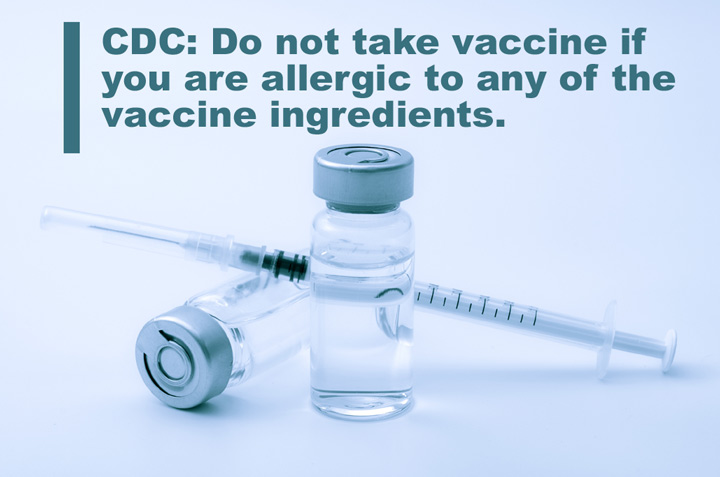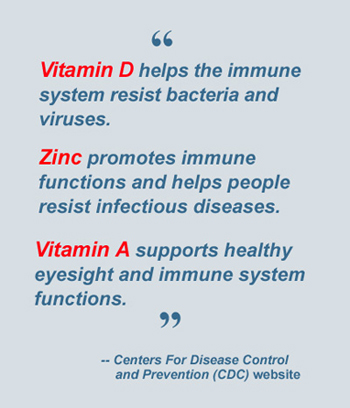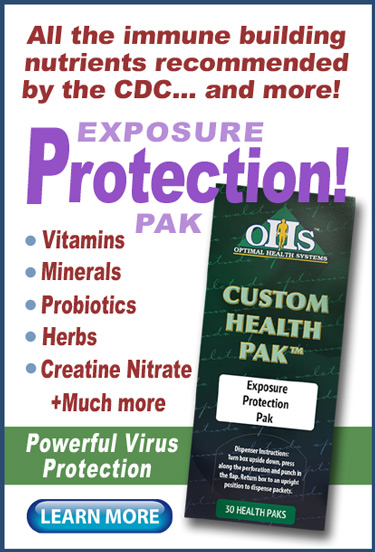Any discussion on not getting a vaccine can cause outrage by vaccine advocates; however, it is important to note that the CDC itself is advising certain groups to NOT get a vaccine.
Moreover, additional groups are advised to have a discussion with their doctor before getting a vaccine—due to being at higher risk of an adverse reaction.
So, without taking a position for or against vaccines, we’ll take a look at these “not recommended” groups—and we’ll also examine the nutrients the CDC says you can take to boost your immune system instead.
Who should NOT get a vaccine?
If you enter a search for “Who should not get a vaccine?” on the CDC website, you will get zero results. No page providing a specific list exists. However, if you explore the website fully you will find the Vaccine Information for Specific Groups page, which is a good place to start if you truly want to educate yourself.
Though the intent of this page is to show the COVID vaccines are safe for just about anyone, fully exploring all the links reveals there are, in fact, groups who are advised to not take a vaccine at all.
Additionally, there are other groups who are cautioned to check with their doctor before proceeding.
J & J Janssen COVID-19 vaccine ingredients:
Recombinant, replication-incompetent adenovirus type 26 expressing the SARS-CoV-2 spike protein, citric acid monohydrate, trisodium citrate dihydrate, ethanol, 2-hydroxypropyl-β-cyclodextrin (HBCD), polysorbate-80, sodium chloride. Full fact sheet and warnings here.
Pfizer-BioNTech COVID-19 vaccine ingredients:
Messenger ribonucleic acid (mRNA), lipids ((4-hydroxybutyl)azanediyl)bis(hexane-6,1-diyl)bis(2-hexyldecanoate), 2 [(polyethylene glycol)-2000]-N,N-ditetradecylacetamide, 1,2-Distearoyl-sn-glycero-3-phosphocholine, and cholesterol), potassium chloride, monobasic potassium phosphate, sodium chloride, dibasic sodium phosphate dihydrate, sucrose. Full fact sheet and warnings here.
Moderna COVID-19 vaccine ingredients:
Messenger ribonucleic acid (mRNA), lipids (SM-102, polyethylene glycol [PEG] 2000 dimyristoyl glycerol [DMG], cholesterol, and 1,2-distearoyl-sn-glycero-3-phosphocholine [DSPC]), tromethamine, tromethamine hydrochloride, acetic acid, sodium acetate trihydrate, sucrose. Full fact sheet and warnings here.
People who should not get a vaccine, according to CDC:
• If you have ever previously had an allergic reaction to ANY of the ingredients listed in the vaccine contents. (See sidebar for ingredient lists of primary U.S. vaccines.)
• If you are under age 18 (recently changed to age12 and under).
• If you have had any reaction to an mRNA vaccine previously (i.e. first dose).
• If you have an allergy to polyethylene glycol or polysorbate.
People who “may want to have a conversation with their healthcare provider” before getting a vaccine:
• If you are pregnant or breastfeeding.
• If you have ever had a reaction to ANY type of vaccine previously.
• People who have autoimmune conditions or weakened immune systems.
The reasons for these cautions, according to the CDC, is that “there are currently limited data on the safety of COVID-19 vaccines” for the different groups.
It should be noted these vaccines are not FDA approved at this time.
Though the U.S. media does not report that the vaccines are not yet FDA approved, the CDC website clearly states the vaccines are “for emergency use only.” For this reason, notices that “safety studies are currently underway” are prevalent on the CDC website.
In addition to the above warnings, a special caution is given relative to the Johnson & Johnson’s Janssen COVID-19 Vaccine: “Women younger than 50 years old especially should be aware of the rare risk of blood clots with low platelets after vaccination.” You can read the full caution at the top of the Pregnant or Breastfeeding caution page here.
If you’re advised NOT to get a vaccine, what can you do?
Considering the fact that many people are advised to not get a vaccine—or at least check with their doctor first—does the CDC offer immune building alternatives for these groups? The answer is yes and no.
The CDC website does not provide immune building information to protect against COVID-19 specifically; however, it does provide information on fortifying the immune system in general, including nutrients that protect against viruses.
The Micronutrient Fact page on the CDC website lists a number of vitamins and minerals that are critical for human development and health. Of these nutrients, there are three the CDC specifically links to immune fortification: Vitamin D, Vitamin A and Zinc.
Ironically the CDC states on the same page that there are widespread deficiencies of all the immune support nutrients. This leaves some experts wondering why nutrient education and distribution programs are not in place to help in the COVID battle.
A person cannot turn on a t.v. or visit the post office without being told how critical it is to get a vaccine; however, hardly anyone is aware that obscure pages on the CDC website also state “Vitamin D helps resist viruses.”
Moreover, the public awareness campaigns to promote other preventative steps—such as hand washing and social distancing—also fail to mention nutrient support. Considering the importance of supplementing nutrients is noted repeatedly on the CDC website, it seems logical to include it in public campaigns. But this valuable info is strangely absent.
Studies highlight extensive list of nutritional supplements for fighting COVID
In addition to the official listings on the CDC website, medical databases such as PubMed are now burgeoning with countless studies examining nutrients that reduce the likelihood of contracting COVID-19.
A Cambridge University study published in January 2021included a list of supplements researchers determined should be taken both before and after receiving a vaccine. The study, entitled Optimising COVID-19 vaccine efficacy by ensuring nutritional adequacy even advocated free supplement handouts for elderly people—the group most likely to be deficient in nutrients.
“We propose that a nutritional supplement containing vitamins A, B6, B9, B12, C, D and E, and the minerals Zinc, Copper, Selenium and Iron, should be provided free of charge to all those aged over 70 years for a period of weeks before and after they receive the vaccine,” researchers wrote in the study summary.
Meanwhile, researchers at the University of Southampton in the UK reviewed the ongoing studies on nutrient support, and published a similar, but longer, list of effective immune-building nutrients.
The study, entitled Nutrition, immunity and COVID-19 was published in the British Medical Journal and advocated the following nutrients: Vitamin A, all B vitamins, Vitamin C, Vitamin D, Vitamin E, Zinc, Copper, Selenium, Iron and probiotics.
Fortunately, acquiring all the nutrients recommended by the CDC—and proven in pandemic studies—doesn’t have to be a complicated task. You don’t have to consume 20 lbs of specific fruits, vegetables and herbs every day!
Instead, reach for the Exposure Protection Pak offered by Optimal Health Systems.
The Exposure Protection Pak delivers a pure, potent, predigested blend of Vitamin D, probiotics, Zinc, nitrates, natural antimicrobials, and more—providing all the immune nutrition you need during the pandemic.
Click the banner ad on this page to learn more
– – –
Sources: CDC website, Cambridge University Press, British Medical Journals – Nutrition, Prevention & Health.



